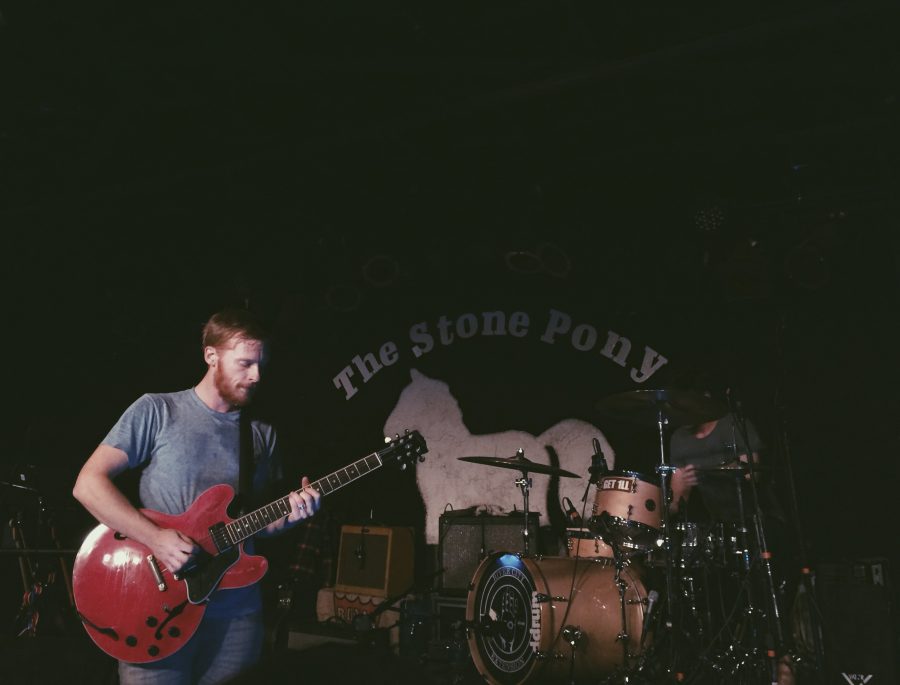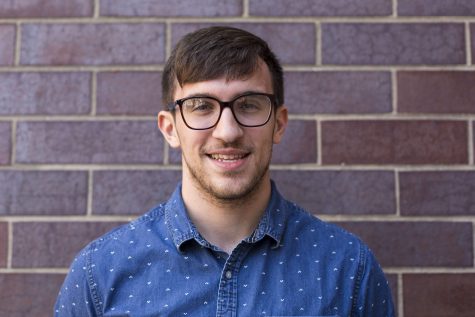Kevin Devine Talks ‘Instigator,’ Social Justice and Musical Growth
Devine, shown here playing a show at “The Stone Pony” in Asbury Park, just released his ninth studio album.
December 5, 2016
For Brooklyn indie artist Kevin Devine, continuing to write songs is synonymous with continuing to understand himself. Devine just released “Instigator,” his ninth studio album. It is equal parts poignant political commentary and stories of personal growth — a conversation with a younger version of himself that uniquely informs listeners. WSN sat down with Devine to talk about what he likes most about “Instigator,” changes in the world that inform his music and the places those changes take him.
Washington Square News: At the time of release, you called “Instigator” your favorite thing that you’ve made so far. What is it about this album that sets it apart?
Kevin Devine: It’s a very coherent and cohesive piece of music. It’s pretty dynamic for something that’s 35 minutes long. It’s not a sprawling double-concept album in length, but I feel like it gets to a lot of different sides of my musical brain without sacrificing what makes my songs different from anyone else’s songs. I completely understand that my experience of my music is and should be totally different from my audience’s. I think this is the best executed batch of songs we’ve ever put together.
WSN: Can you talk about the political inspiration behind the album — particularly a song like “No History” [a song centered around Devine’s experience on the day of 9/11]?
KD: A song like “No History” takes a while to be written. I don’t mean that in an active sense. The song showed up at 8:30 in the morning one weekday last June. And the structure of the song was pretty much there by 2 o’clock that day. The motivation, or what actually drives that song above the surface of your consciousness, can take 15 years.
For me, I tend to try to write songs that are pro-people — I guess social justice songs in that way. I’m not as interested in politics. I think politics are kind of an ugly thing. I mean think about it — if you’re speaking about a person in your life behaving politically, it’s never a good thing. You don’t mean it like, “that guy’s awesome.” You mean it like, “that guy’s calculating and manipulative.” Sometimes pro-people songs sound negative or sad, because you’re writing from the perspective of the inevitability of history or how power dynamics work. It’s stuff that talks about what it’s like to be underneath the boot a little bit.
It’s not like the problems with the United States’ domestic and foreign policy started with George Bush. They were around before that. And it’s not like our current problems started with the election of Donald Trump — they were around before that. It’s just that these things tend to be the difference between the tape on play and the tape on quadruple fastforward.
WSN: Are these ideas the driving force behind a decision like the one you made to give all the tour and merch proceeds to Planned Parenthood and ACLU?
KD: I’m a guy that plays shows in front of between 150 and 1,000 people. I’m not a politician. I’m not a celebrity. I’m not a famous rockstar. I’m a person who’s well-known in a corner of culture.
Planned Parenthood and the ACLU and the Southern Poverty Law Center and LGBTQ organizations — those are the people who are going to be really under siege in a regressive, bigoted, post-fact, anti-women, anti-gay, anti-Muslim, anti-immigrant, anti-minority administration. We’re not going to raise millions of dollars for them, because that’s not the scope at which I exist. But it’s a small action we can take.
WSN: In what ways did growing up in Brooklyn influence your musical direction, and how has that changed from record to record?
KD: I think a hallmark of a New Yorker is being a curious person. There’s a story everywhere. I’m definitely somebody who looks up at every apartment building to see what’s going on in every window and every storefront and every person asleep on a train.
Sonically speaking, I kind of feel like I’m letting Brooklyn down — I wasn’t Beastie Boys or LCD Soundsystem or anything like that. But I think philosophically and lyrically it’s a bit more at home in that way.
WSN: This year marked the 10th anniversary of “Put Your Ghosts to Rest,” a pivotal album for you. Can you talk about what the personal journey has been like from that album to this one?
KD: I have this friend who’s in his late 60s. And he says that every time he sees himself in a mirror he’s like, ‘Who’s that old guy?’ Because your brain always thinks you’re 17 or 22 or whatever it is.
That’s kind of what “I Was Alive Back Then” was about for me — trying to have all of those selves in a room having a conversation for a little while: the eight-year-old, the 36-year-old, the 23-year-old, the 20-year-old. All of them are still in there somewhere, so why not try to reconcile them a bit and have it be a little bit more peaceful?
It feels like I’m continuing the conversation a little bit while connecting to a song like “Brooklyn Boy” or a song like “Ballgame.” Sometimes I feel like “I Was Alive Back Then” is like me now talking to me then. Taking stock and trying to have a conversation. In some ways [the EP is] a nice bookend to that song and those experiences. Part of me when I wrote “I Was Alive Back Then” was like, ‘Well maybe you’re done.’ I was like, ‘I don’t know if you’re gonna say it better than that.’ Whatever ‘it’ is that I’ve been trying to say for 15 years.
WSN: How do you settle on outside influences with things like album art?
KD: This one kind of fell out of the sky. I was looking for pictures of something else at my mom’s house and found that and was like, ‘Oh, that’s amazing.’ It’s really funny, obviously, but also I love my dad’s knee with a glass of scotch on it. I could just hear him thinking, ‘Oh God, these kids, just shut up, I gotta go to work in the morning.’ There’s a lot of sweetness in that picture, and a lot of essential childhood stuff in that picture.
This interview has been edited for length and clarity. Kevin Devine is headlining at Irving Plaza this Thursday, Dec. 8.
A version of this article appeared in the Monday, Dec. 5 print edition. Email Bobby Wagner at [email protected].































































































































































